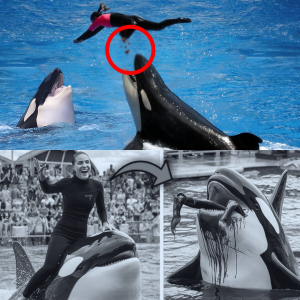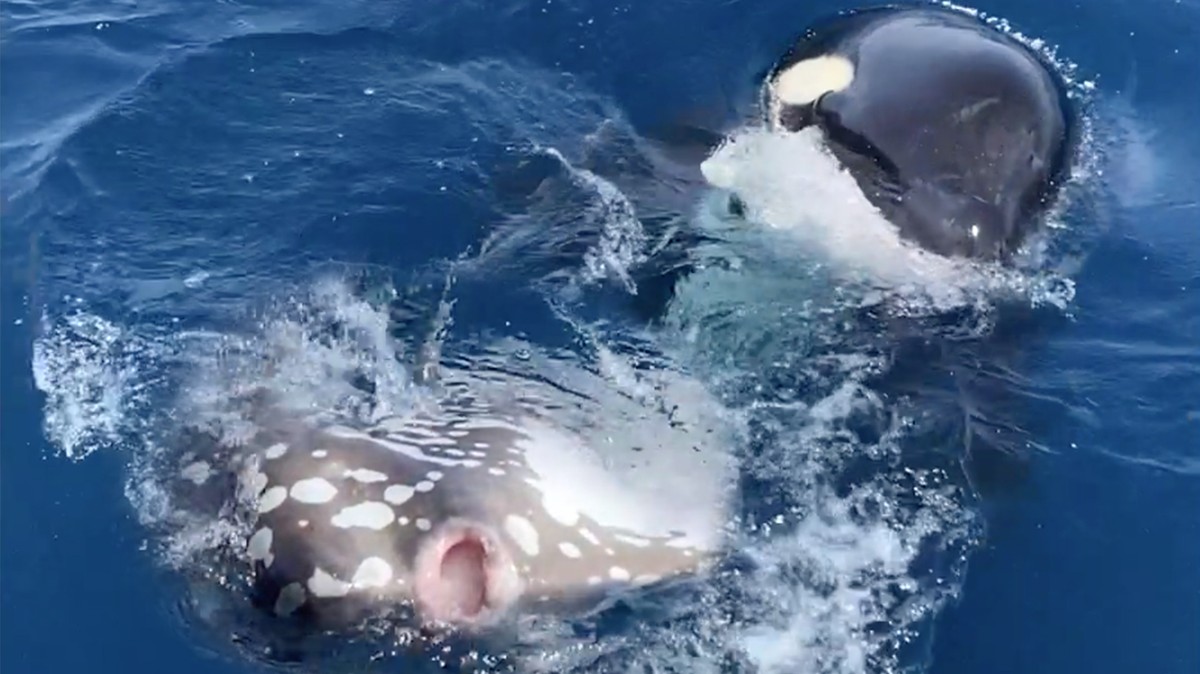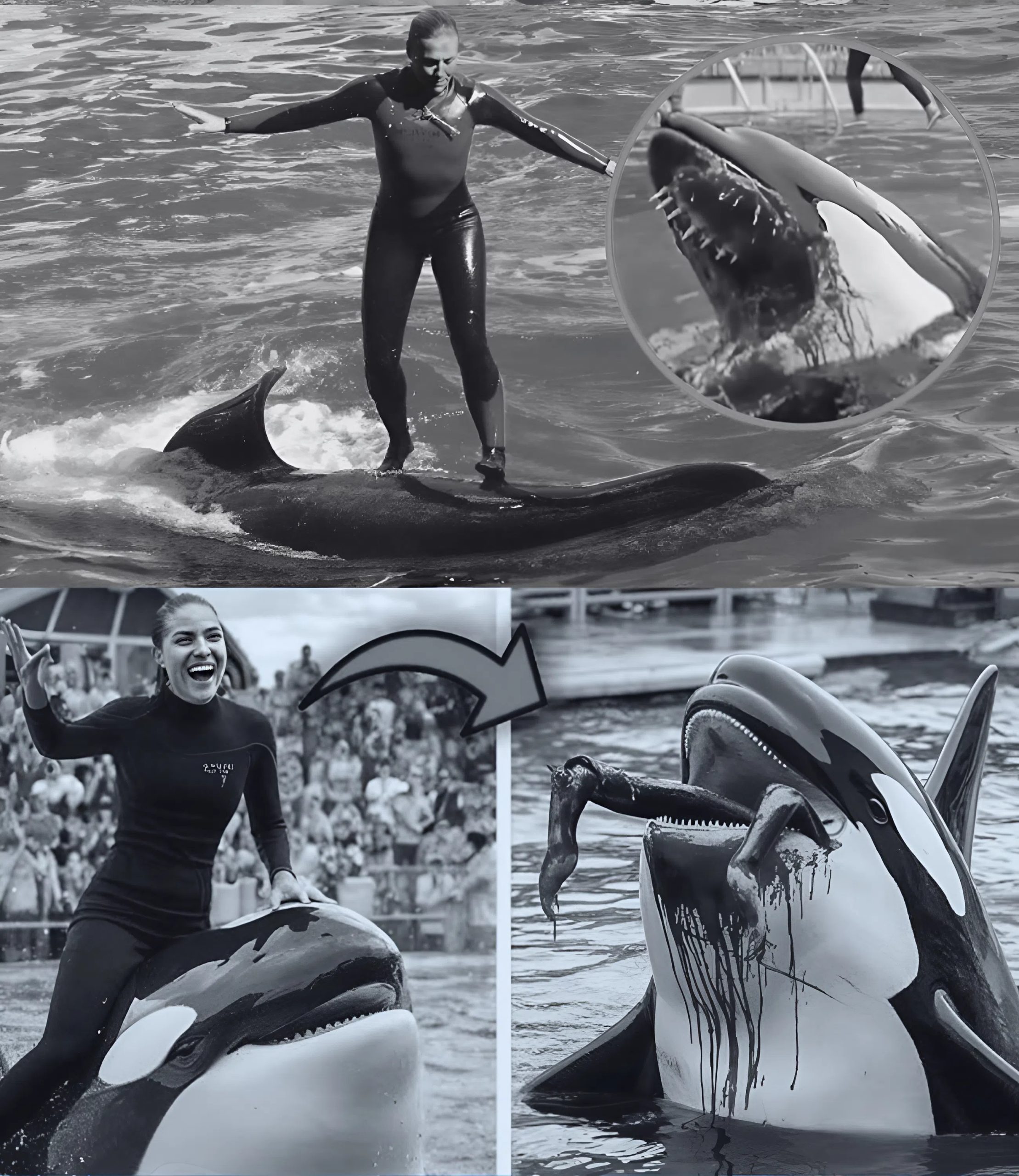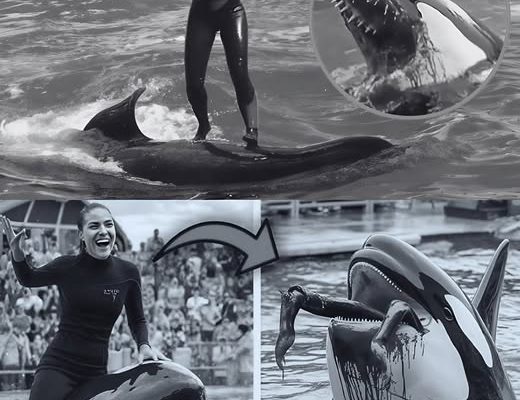INTRODUCTION: A Nation Gripped by Tragedy
It was supposed to be just another dazzling marine show — a spectacle of trust, elegance, and interspecies choreography. Families clapped. Children pointed. Phones filmed. But what unfolded on that sunny afternoon in San Diego has now become one of the most disturbing, widely viewed, and deeply soul-searching moments in the history of animal entertainment.
Jessica Radcliffe, 34, was a veteran whale trainer — beloved by peers, admired by fans, and respected in her field. But her final performance at OceanWorld Marine Park ended in seven minutes of unrelenting terror, captured by a security camera and later leaked online. Those moments, which now haunt the national conscience, have sparked not only grief and outrage — but a reckoning.
Beneath the applause, behind the glittering shows, and underneath the still water, something darker was waiting to surface.

THE WOMAN BEHIND THE SHOW: Jessica’s Rise and Devotion
Jessica Radcliffe wasn’t just another trainer in a wetsuit. Born in Monterey and raised just miles from the Pacific, she developed a fascination with marine life from a young age. She earned her degree in marine biology with honors and began working with captive orcas by 22. Within five years, she was promoted to lead trainer at OceanWorld — a role she approached with passion and what many described as an almost spiritual bond with the animals.
Her connection with Luna, a 7,500-pound orca born in captivity, was well known. They had performed together for over nine years without incident. Audiences described their relationship as “magical” — a seamless dance between woman and beast.
But that “magic” may have hidden a silent breakdown no one saw coming.
THE DAY OF THE INCIDENT: What the Cameras Revealed
On July 29th, 2025, hundreds gathered to watch the signature performance: Dance of the Giants. At exactly 2:30 p.m., the show began — choreographed music blared, the crowd cheered, and Luna responded flawlessly to Jessica’s cues.
Until she didn’t.
At 2:47 p.m., Jessica entered the pool for their celebrated “spiral dive” sequence. But Luna broke from the script. Instead of surfacing as trained, the whale submerged, dragging Jessica with her. Onlookers first thought it was part of the act. But as seconds became minutes, the cheers turned to screams.
In the now-leaked footage, Jessica is seen struggling beneath the water’s surface, signaling frantically. Rescue divers leapt in — but Luna, exhibiting a behavior known as deep-holding, circled, blocked, and resisted.
By the time Jessica’s lifeless body was retrieved, seven minutes had passed. CPR was attempted. But it was too late.

WHY DID THIS HAPPEN? The Science of Stress, Confinement, and Whale Psychology
Orcas are not circus animals. They are apex predators — intelligent, social, and known for their emotional depth. In the wild, they can travel up to 100 miles a day. They form lifelong family bonds, communicate with complex dialects, and experience grief.
In captivity, that reality changes.
Experts believe Luna’s behavior was not random — but a manifestation of long-term psychological distress. Dr. Serena Malkovitch, a leading marine behaviorist, reviewed the footage:
“This wasn’t a freak accident. Luna displayed escalating warning signs weeks — perhaps months — before this happened. Captivity deforms a creature’s mind. Jessica paid the price for a system designed to entertain, not protect.”
Former trainers have since stepped forward, revealing that Luna had shown signs of agitation: refusing food, ignoring commands, exhibiting repetitive swimming patterns — classic signs of zoochosis, a psychological disorder in captive animals.
Worse, one trainer alleges that Jessica filed a formal complaint just two weeks prior, expressing concern that Luna was “becoming unresponsive and emotionally unpredictable.” That complaint, they say, was buried.
OCEANWORLD UNDER FIRE: Silence, Denial, and Legal Fallout
OceanWorld’s initial statement, released hours after the incident, described it as a “rare tragedy.” But as the footage spread and whistleblowers emerged, their position has become increasingly untenable.
Internal emails, leaked anonymously to this publication, reveal that park executives were aware of behavioral issues. In one email dated July 14th, a manager warns: “If Luna acts up again during showtime, we’ll need to reevaluate her exposure. Keep things calm. No more surprises.”
Now, Jessica’s family has filed a $100 million wrongful death lawsuit, accusing the park of criminal negligence, suppression of safety protocols, and “knowingly placing a human being in a fatal situation to preserve revenue.”

As of this writing, state regulators have launched a full investigation. Meanwhile, OceanWorld’s attendance has dropped 47% in four days. Sponsors are pulling out. And the park’s flagship show has been indefinitely suspended.
LUNA: Killer or Victim?
The question now isn’t just what happened — but what should happen next.
Some demand Luna’s immediate removal or even euthanasia, calling her a dangerous animal. Others argue she’s not the villain — but the most tragic victim of all.
Environmental groups like WildBlue and Oceanic Truth are calling for Luna’s transfer to a sea sanctuary — one of only three in development worldwide. But relocation is costly, complicated, and politically fraught.
Dr. Karen Li, director of Pacific Animal Law Center, said it bluntly:
“We created this monster. Not the whale — the industry. The cages, the applause, the profits, the silence. Luna only reminded us what we’ve been pretending not to see.”
AFTERMATH: A Moment of Reckoning
Jessica Radcliffe’s death was more than an accident — it was a mirror. One reflecting how easily we mask cruelty with choreography, how we confuse obedience with consent, and how we turn sentient beings into spectacles.
In the days following the tragedy, mourners have gathered outside OceanWorld’s gates, leaving flowers, handwritten notes, and photos of Jessica. Across social media, a haunting phrase circulates alongside footage of her final moments:
“She died doing what she loved. But she shouldn’t have had to die at all.”
CONCLUSION: The Water Was Never Safe — We Just Pretended It Was
As the national debate intensifies, as legal proceedings begin, and as lawmakers hint at sweeping reforms, one thing is clear: Jessica’s death has cracked open a conversation long overdue.
Maybe Luna snapped. Maybe she cried for help the only way she could.
And maybe — just maybe — the world is finally listening.








